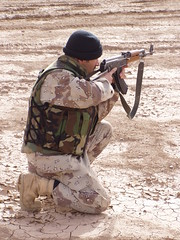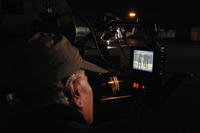 Ongoing surge operations in Baghdad are doubling as training opportunities for Iraqi soldiers, airmen and government officials. U.S. strategy entails turning over responsibility for security in Iraq to native entities as soon as theyre ready; the demands of the surge have forced Iraqis to be readier, sooner.
Ongoing surge operations in Baghdad are doubling as training opportunities for Iraqi soldiers, airmen and government officials. U.S. strategy entails turning over responsibility for security in Iraq to native entities as soon as theyre ready; the demands of the surge have forced Iraqis to be readier, sooner.
Iraqi army battalions disintegrated last year when we tried to move them around, says Major General William Caldwell, spokesman for U.S. forces in Iraq, referring to several Iraqi units that refused to deploy to trouble spots from their home bases in the north or south of the country. Many of the Iraqi soldiers involved cited a lack of preparation. Now we have them ready to move, Caldwell stresses. By the middle of March, we should have three Iraqi brigades in Baghdad.
Iraqi forces in the contested city now number more than 20,000, and Iraqi officers have taken the lead in many Baghdad missions. The tiny Iraqi air force is stepping up operations, as well, flying troop transport missions for deploying units using three U.S.-donated Lockheed Martin C-130E Hercules airlifters in addition to conducting Baghdad surveillance with CH-2000 reconnaissance planes.
Theres been an increase in Iraqi air force operations in recent weeks, says Brigadier General Stephen Hoog, chief U.S. trainer for the Iraqi air service. They did their first medevac mission about seven days ago theyre setting up channel missions to take wounded northern Iraqi troops back home. And the CH-2000s are going on one or two missions every day checking out checkpoints. All thats missing from operations is Iraqs sizeable force of helicopters, which are awaiting the installation of the defensive gear they need for Baghdad missions. By the middle of summer, well see much greater participation of their helicopters.
The surge hinges on significant diplomatic efforts by Iraqi politicians aiming to cut off the flow of weapons and insurgents into Baghdad and to keep the citys militias peaceful. The U.S. government got the Iraqi Prime Minister [Nouri Al Maliki] to make it clear to the militias that theres no room for militias, and that those that ignored that warning were going to be dealt with, reports Ambassador Daniel Speckhard, deputy chief of the U.S. mission. As a result, many of them dissolved or have ended their activity or moved out of Baghdad. Speckhard adds that Al Maliki recently took his first official trip to western Iraq to meet with tribal leaders who are key to intercepting weapons coming in from Syria.
--David Axe, cross-posted at War Is Boring
Surge = Training Op for Iraqis
© Copyright 2024 Military.com. All rights reserved. This article may not be republished, rebroadcast, rewritten or otherwise distributed without written permission. To reprint or license this article or any content from Military.com, please submit your request here.








